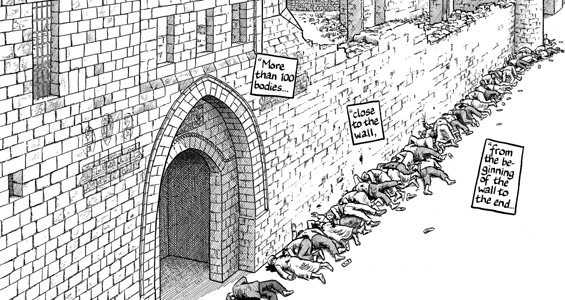
Journalist and cartoonist Joe Sacco used his appearance at the Edinburgh International Book Festival to talk about the unique strengths of graphic reportage, the importance of “honest journalism” and the power of outrage. His most famous works, the harrowing travelogue Palestine and the Bosnian war chronicle Safe Area Gorazde, have set the benchmark in comic book journalism, a medium with huge potential impact in which the reporter’s reproduction of events is limited only by their ability to draw. The comic book medium, said Sacco, is somewhat at odds with traditional, (apparently) objective journalism, since the very act of drawing is itself subjective in nature.
Throughout his journalistic career, Sacco has embraced this subjective approach by featuring himself as a character in many of his works. Asked whether this was a deliberate comment on the inherent subjectivity of all news reporting, he said no, but suggested that many viewers/readers are indeed beginning to twig that so-called ‘traditional journalism’ is actually subjectivity portrayed as objectivity, since everybody has preconceptions and assumptions that they bring to reportage. The inclusion of himself in his reporting is, he said, merely his attempt to emphasise that what we’re reading are his experiences, as well as to preserve the reaction of local people to outsiders, which is always interesting to watch.
A well-travelled man, Sacco has lived in Malta, Australia, the United States, Germany and the middle east. His experience of so many different people and places has helped him over the years to refine his style, and better appreciate the strengths of graphic reportage. Not having a TV crew around, for instance, has meant that he’s been able to blend into the background, and that his interviewees haven’t been able to simply “play for the camera”. According to Sacco, he works mainly from photographs when he draws, as he discovered over time that a sketchpad can get in the way when conducting interviews or capturing events as they unfold. This doesn’t always work, though; Sacco reminisced about a particular Israeli military checkpoint where it would have been unwise to brandish a camera….

Sacco said that there should be more outrage in journalism, although not for its own sake, and that he “crossed the line early on” in 1982 when he learned of the Sabira and Shatila massacres in Beirut. That was the point at which, he said, he became aware that he didn’t actually know what was going on in the world, and began to distrust what he saw as one-sided news reporting in the US media. He has subsequently reported on conflict and social upheaval in Gaza, the West Bank, India, Malta, Bosnia, Iraq and Chechnya, his anger at the situations he encounters being somewhat tempered by the knowledge that he can at least tell the story of the people suffering, even if it only makes the smallest of differences. He strives for honest reporting, but also recognises that portraying people simply as victims can be dehumanising; the situation is always more complicated than that. “It’s only when you get there,” said Sacco, “that you realise what’s really going on.”
The publication of a compilation of his work, entitled Journalism, last year seemed to draw a line under one phase of his career, so what can we expect from Joe Sacco in the future? He says the plan is to move away from conflict reportage, or at least find a new approach to it. He’s now looking at ancient Mesopotamia as the basis for a possible historical project, but his next publication actually sounds like one of the most ambitious he’s ever undertaken. The Great War is due to be published next month, and will consist of a single, foldout panorama of one day at the battle of the Somme during the First World War. According to Sacco, such a project was very attractive to him because of the challenge of producing something entirely without words, his desire to portray a “mass human event”, and his deep and abiding personal interest in the history of the First World War. If the quality of his previous work is anything to go by, it should be horrifying and breathtaking in equal measure.
Journalism is available now, priced at £18.99. The Great War will be published on 3rd September.
